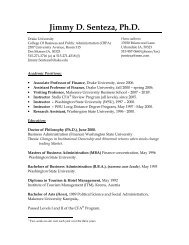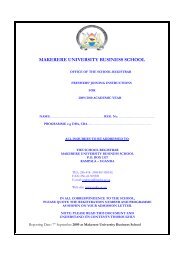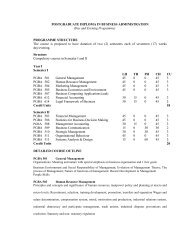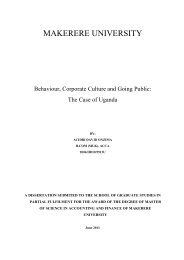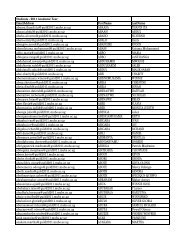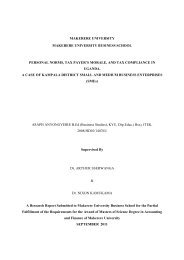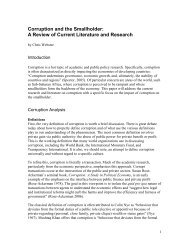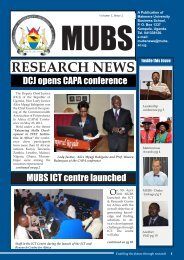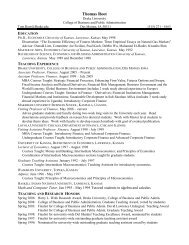13th Annual International Management Conference Proceeding
13th Annual International Management Conference Proceeding
13th Annual International Management Conference Proceeding
Create successful ePaper yourself
Turn your PDF publications into a flip-book with our unique Google optimized e-Paper software.
with regard to training, research and consultancy. KIA can influence more policy decisions on these areas. If<br />
KIA continues to “live entrepreneurship” it will be easier to train, research and consult in entrepreneurship<br />
giving more support to those who train creative, innovative risk and initiative takers. If the enterprise culture<br />
is developed in Kenya, some of the challenges facing the country today as evidenced by the Vision 2030<br />
(GOK, 2006:6), such as: income inequalities, low savings, and unemployment among the youth may be<br />
reduced as the country becomes more economically independent.<br />
Finally, this paper concludes that the Institute still has a critical role to play in enterprise culture<br />
development in Kenya by specifically providing more input in the areas of policy formulation, training,<br />
research and consultancy.<br />
5.1.1 Recommendations for Policy Making<br />
Priority actions should be taken to enhance enterprise culture in Kenya in entrepreneurship. There is much<br />
challenge in making organizations and individuals entrepreneurial. For example, in training, the challenge for<br />
KIA is to lay emphasis on learning by doing. To surmount these challenges, the Institute has to take the<br />
necessary measures aimed at enhancing efficiency in service delivery within the region by basically “walking<br />
the talk”. The Institute can therefore respond effectively, efficiently and on time to research and consultancy<br />
needs without compromising on both quality and content. The Institute works with associate trainers and<br />
consultants whose services it utilizes on a need basis.<br />
5.1.1.1 Abundant Enterprising Individuals<br />
The challenge here is how Kenya and others in the support system can develop an enterprise culture to<br />
increase the number and success rate of entrepreneurs. This paper has not exhaustively addressed these<br />
concerns, but provided a starting point for consideration of more Business Development Services (BDS)<br />
(auxiliary services provided for SMEs improvement) and support given to entrepreneurs, trainers and policymakers<br />
by the Kenyan entrepreneurial support system.<br />
5.1.1.2 Network of independent business/family contracts and acquaintances<br />
Working methods in the world are becoming more network oriented as Hull, (2003) advises. KIA should<br />
undertake collaborative initiatives with its stakeholders including its alumni. Formation of Association by<br />
Alumni should be encouraged as a starting point in more networking.<br />
5.1.1.4 Entrepreneurship Training<br />
Many entrepreneurs in Kenya not benefited from entrepreneurship training. To fill this gap, a more<br />
encompassing entrepreneurship development policy should be developed to cater for all entrepreneurs. The<br />
increasing players providing training to SMEs should guided by a coherent training policy (Mullei and<br />
Bokea, 1999). KIA can assist the government in developing a long–term training strategy and policy stating<br />
the role of each player.<br />
For the trainers, the entrepreneurial concept should be central to training objectives. Enterprising training<br />
enhances participation, entrepreneurial behaviour and skills of participants with the trainer facilitating<br />
learning to stimulate enterprising responses. Arguably, an enterprising trainer must constantly be backed up<br />
by an enterprising organization to develop an enterprising approach (Douglas, 1992). In a bid to address<br />
the above issues, a comprehensive public training and capacity building policy should be developed to ensure<br />
that training is systematic, well coordinated, demand driven, and cost-effective. Capacities in training<br />
institutions should also be enhanced. A national campaign to inspire and mobilize young people to be<br />
enterprising should be undertaken. There is also need for feedback from employers in enterprises to training<br />
institutions such as KIA.<br />
Policy actions recommended in GOK documents (GOK, 1986,1988, 1992 and 2005) have partially been<br />
implemented. Some are not properly targeted and interpreted to develop enterprise culture, increase<br />
entrepreneurs and enterprise productivity. KIA and other players can organize strategic workshops to discuss<br />
the implementation end evaluation of entrepreneurship policies.<br />
Entrepreneurial curricular should contribute greatly to a more dynamic entrepreneurship culture<br />
development by supplying more and better-prepared graduates who are tuned to self-employment. But,<br />
26




